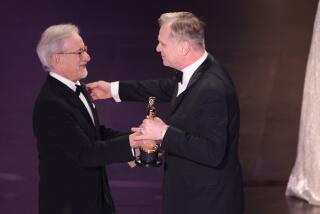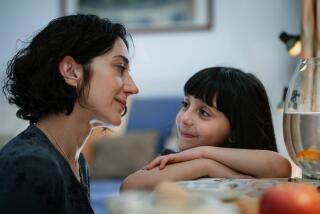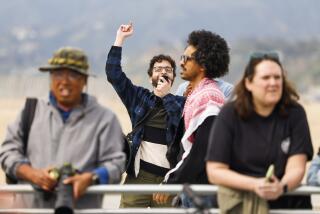‘The Past’ is very much present for Asghar Farhadi, Berenice Bejo
The hustle and bustle of the annual awards circuit can have unintended results, such as creating unlikely introductions.
“The Past,” which opens Friday in Los Angeles, brings together Iranian filmmaker Asghar Farhadi and French Argentine actress Bérénice Bejo. The two first met in passing in Los Angeles when each was on the Oscar circuit a couple of years ago. Farhadi was promoting “A Separation,” which would win the Oscar for foreign language film and be nominated for screenplay, while Bejo was supporting eventual best picture winner “The Artist,” for which she also earned a supporting actress nomination.
“It was the best thing that could have happened to me after ‘The Artist,’” Bejo said of her role in “The Past” during a recent phone call from Paris, having just returned there from five months in the country of Georgia shooting the next picture by “Artist” director (and her husband) Michel Hazanavicius.
The collaboration with Farhadi garnered Bejo the best actress prize earlier this year at the Cannes Film Festival, where “The Past” premiered.
The film connects the overlapping stories of two couples. Bejo plays Marie, living in the suburbs of Paris, who as the film begins is picking up her estranged husband, Ahmad (Ali Mosaffa), at the airport.
Bejo is struck by how the film’s unusual structure makes it hard to pinpoint just what it is about and has at times been embarrassed as she has fumbled for words to describe it.
VIDEO: Cannes 2013 | Watch the trailer for ‘The Past’
“It’s such a difficult movie to speak about,” Bejo noted. “It goes in so many different directions. And I suppose that’s why I liked ‘A Separation.’ You are on the side of one character during one scene, you are with a different character two scenes later, then you learn something else and change your mind again. Asghar is always taking you down different paths and never where you think he is going to take you.”
The couple have been separated for years, Ahmad having returned to Iran, and are now finalizing their divorce so that Marie can be free to marry Samir (Tahar Rahim). Both Marie and Samir have children from previous relationships who are blending into a new dynamic, while Samir is himself not entirely clear of his previous marriage.
The film’s structure is both unusual and organic. Beginning with Marie and Ahmad, the film eventually introduces Samir, then hands off its attention to Marie’s daughter Lucie (Pauline Burlet) and finally ends with the story of Samir’s wife, who is in a coma. The way the stories unfold one into the other captures the way in which any one episode in a life contains many smaller, interrelated stories.
“It’s a little bit difficult for me to explain,” said Farhadi during a recent interview in Los Angeles, “but the structure I came to is similar to a dominoes game, when the first one goes and then it causes the next piece to fall and then the next and the next. What makes it difficult to talk about is to explain it you’d have to talk about what each piece represents.”
Farhadi was able to assemble his actors before shooting for an extensive rehearsal period, which did not consist of going over specific scenes so much as simply talking about the characters. Farhadi prods his actors with questions while avoiding giving them specific answers in return. Farhadi feels this allows the actors to feel a part of the creative process.
RELATED: Complete list of 2014 Oscar foreign-lanuguage film submissions
In Bejo’s powerful performance the character of Marie goes through many different emotional states, from wounded to angry, accusatory to guilty. Even bringing her soon-to-be-ex-husband Ahmad to stay in her house seems a purposeful provocation.
All of which brings up the reasonable question of whether the actress herself would make the same decisions as her character. Or, more simply, does Bejo like Marie?
“I don’t ask myself this question,” said Bejo. “I remember saying a lot of time to Asghar, ‘It’s funny, I don’t agree with her.’ I would never be like Marie. Her life is kind of a disaster. So I’m very far from her, but yet I understand her. Now when I see the movie, I feel like she’s selfish sometimes, lovable in some scenes and in the end I think she’s a strong and beautiful character because she makes peace with everyone.
“In the end, we all deal with things, we cannot be good every day of our lives,” added Bejo. “Marie is in a period of her life where she feels unloved, she’s stressed, she’s angry and at the end of the movie I think she really deals with it. The movie is about that, I think.”
As in “A Separation,” Farhadi presents his characters in moments both good and bad, giving them the layered personalities of real people. For him, this question of whether an audience can continue to identify with a character in moments when they may not be likable in the traditional movie sense is missing the point.
“This is an error that exists in a lot of films, this misconception that as a character gets more and more complicated, the audiences will move further and further away from that character,” he said. “Actually, audiences like complication.
“This is what is making American cinema come down from its position in the classic, golden period,” he added sharply. “There is the misapprehension that the audience is not smart. I think one should not be afraid of that. The more complex a character is, if the complexity is approached correctly, the audience is going to be more absorbed.”
Bejo noted how she didn’t expect to win the best actress prize at Cannes, in particular because of the waves of acclaim given at the festival to the two young actresses in the film “Blue Is the Warmest Color.” When she won the prize she invited Farhadi onstage with her because she felt her performance was because of him.
“I thought the movie or Asghar would win something. I never thought I was going to win something,” she said. “If I’m good in the movie it’s because Asghar did something with me.”
More to Read
Only good movies
Get the Indie Focus newsletter, Mark Olsen's weekly guide to the world of cinema.
You may occasionally receive promotional content from the Los Angeles Times.







